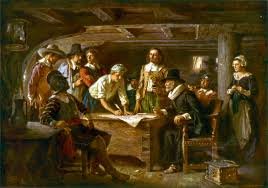 (This article originally appeared in the Orlando Sentinel, November 28, 2013, and is reposted with permission of the author.)
(This article originally appeared in the Orlando Sentinel, November 28, 2013, and is reposted with permission of the author.)
By Bryan Fulwider
[dc]H[/dc]ouseholds throughout the United States are celebrating a presidentially designated Thanksgiving Day. It provides us an opportunity to reflect on the blessings we enjoy as a nation and personally.
The history of this holiday goes back to the arrival of the Pilgrims at Plymouth, Mass., in the late autumn of 1620. Although the New World saw intermittent European activity after the arrival of Christopher Columbus in 1492, in the minds of many, American history truly began with the Pilgrims.
Because most of the occupants of the Mayflower had belonged to a persecuted religious minority in England – Congregationalists, part of the dissenting church movement – they came seeking freedom to practice religion in concert with each individual’s own conscience. But the Pilgrims’ quest was by no means the only reason America came to be viewed as a shelter from religious persecution and intolerance.
Twelve years after the arrival of the Pilgrims, the colony of Maryland received its charter. Maryland was founded as a haven for Catholics who – not unlike the Congregationalists – had become a persecuted minority in England as a result of the state-run Church of England.
The colony of Pennsylvania was founded by a Quaker, William Penn. Quakers – who at times had also been persecuted in England – as well as other Christian minorities from Europe, sought refuge there; on that list were the Mennonites and Amish. However, only monotheistic religions were welcome, highlighting the kind of inconsistency Americans have too often demonstrated in our granting of religious freedom.
A mere 15 years after the arrival of the Pilgrims at Plymouth, a young preacher named Roger Williams stirred up the nearby Massachusetts Bay Colony by arguing that church and state should be separate. It was Williams who coined the phrase, “a wall of separation between church and state.” He also argued that civil magistrates should not have the right to impose civil penalties for religious infractions such as failure to honor Sunday as a sacred day.
Williams was convicted on charges of both sedition and heresy, and banished from the colony – a colony of Puritans who were obsessively committed to crossing every “t” and dotting each “i” of religious propriety. Eventually, he had to escape under cover of darkness, in fear of losing his life to the “good Christians” who had convicted him.
Fleeing to what is now Rhode Island, Williams established a religiously open colony that welcomed all faiths and that sought to keep church and state separate. As a result, Rhode Island was the destination of many early Jewish arrivals. But Jews were not welcome everywhere in America; neither were Catholics, or those of many other religious persuasions.
The last of the 13 original colonies – Georgia – was established by an English general, James Oglethorpe. He envisioned the colony as a haven for the “worthy poor,” who were unnecessarily filling England’s debtor prisons. He opposed slavery and banned it from his new colony (though that provision was revoked in less than 20 years).
Despite the guarantee of religious freedom in Georgia’s charter, there were two clearly stated exceptions: Jews and Catholics were banned.
Religious freedom has a far more checkered history in America than many realize. The founders of various colonies wanted freedom of religion for themselves. But they found it far more difficult to grant such a privilege to others. Throughout our nation’s history, minority religions have often faced an uphill battle.
So, as we celebrate Thanksgiving this year:
Let’s rejoice in the visionary courage of so many of our forebears, who recognized the desirability of freedom of religion.
Let’s reflect on how difficult it has been throughout our history to deliver religious freedom consistently and to all, however much we might have given lip service to the concept.
And let’s resolve to a new future, together as people of goodwill, to ensure that minority religions – and even those of no faith -experience the same degree of religious freedom that those of us in the majority expect for ourselves.
The Rev. Bryan Fulwider is president and co-founder of the nonprofit Building US and chair of the executive committee of the Interfaith Council of Central Florida.

